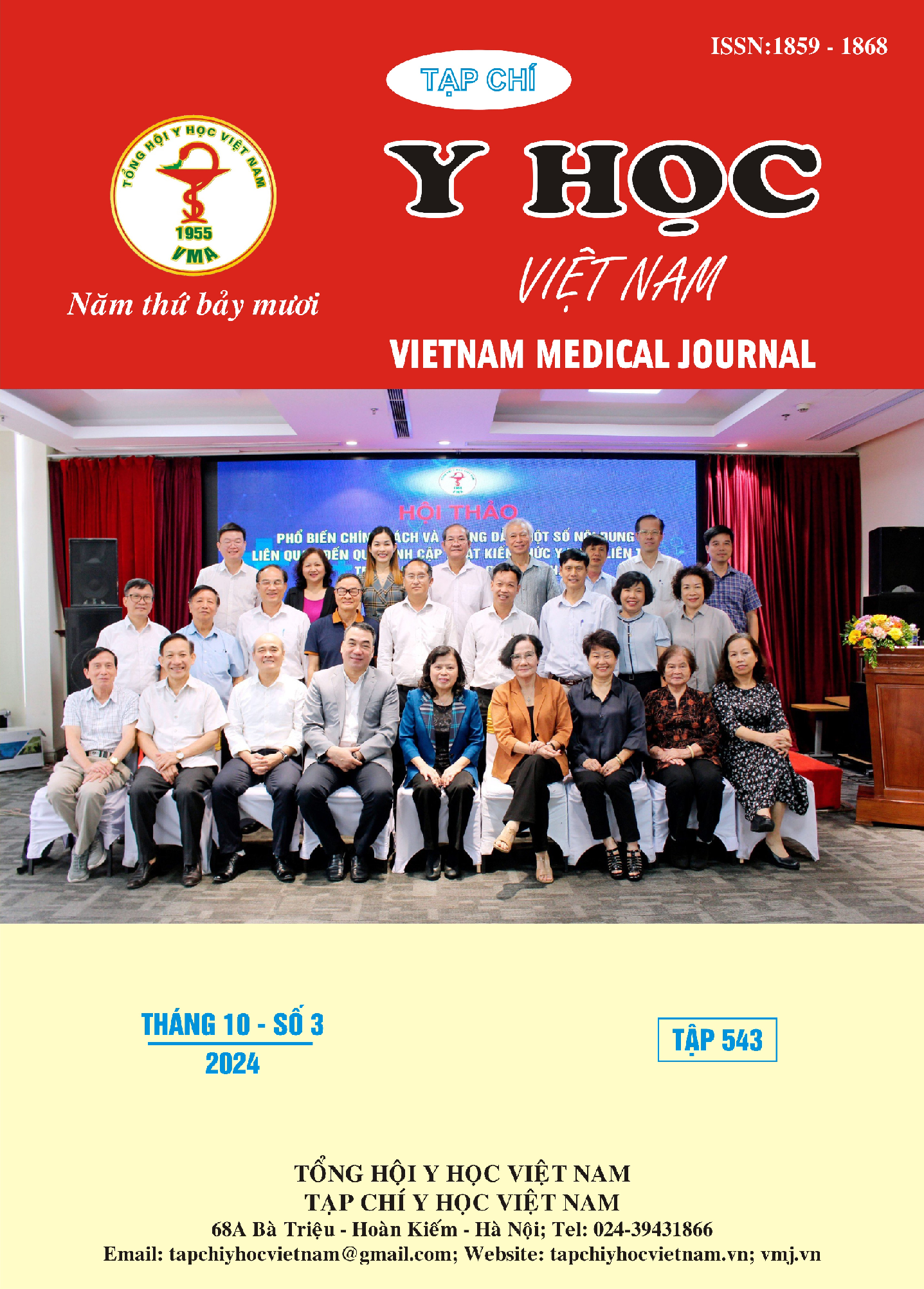SIDE EFFECTS OF CAPOX REGIMEN IN ADJUVANT THERAPY IN STAGE III COLON CARCINOMA PATIENTS AT NGHE AN ONCOLOGY HOSPITAL
Main Article Content
Abstract
Objective: To evaluate the side effects of adjuvant chemotherapy with the CAPOX regimen in stage III colon carcinoma patients. Subjects and Methods: Descriptive on 61 stage III colon carcinoma patients who underwent curative surgery and received adjuvant chemotherapy with the CAPOX regimen at Nghe An Oncology Hospital from January 2018 to December 2023. Results: The average age of patients was 60.3 ± 10.3 years, the age group 60-69 years had the highest rate at 41%. Stage IIIB was the most prevalent with 73.8%. The performance status (PS) score was primarily 0-1, in 98.4% of cases. Chemotherapy was initiated within 8 weeks post-surgery in 86.9% of patients. The most common hematologic toxicities included anemia (73.8%), neutropenia (68.9%), and thrombocytopenia (65.6%), primarily of grade 1 or 2. Hepatic toxicities involved elevated AST (65.6%) and ALT (44.3%), predominantly of grade 1, with the highest incidences being 60.7% and 41%, respectively. Renal toxicity was rare, with only grade 1 recorded at 3.3%, and no grade 3 or 4 toxicities observed. Gastrointestinal toxicities included nausea (50.8%), vomiting (32.8%), diarrhea (27.9%), and less frequently mucositis (14.8%). Hand-foot syndrome occurred in 34.4% of patients, peripheral neurotoxicity is a common cumulative toxicity, occurring in 72.1% of patients, and is a factor to be considered when choosing long-term treatment. Conclusion: The CAPOX regimen for adjuvant treatment of stage III colorectal carcinoma is safe in the colon carcinoma patient, with side effects remaining within acceptable levels.
Article Details
Keywords
Colon carcinoma, adjuvant chemotherapy, CAPOX regimen.
References
2. IARC. Globocal Carcinoma Observatory Vietnam Population fact sheets.:March, 2021. [Online]. Availabe: https://gco.iarc.fr/ today/data/factsheets/populations/704-viet-nam-fact-sheets.pdf. [Accessed 5/5/2023].
3. Sargent D, Sobrero A, Grothey A, et al. Evidence for cure by adjuvant therapy in colon carcinoma: observations based on individual patient data from 20,898 patients on 18 randomized trials. J Clin Oncol. Feb 20 2009;27(6):872-7. doi:10.1200/JCO.2008.19.5362
4. Haller DG, Tabernero J, Maroun J, et al. Capecitabine plus oxaliplatin compared with fluorouracil and folinic acid as adjuvant therapy for stage III colon carcinoma. J Clin Oncol. Apr 10 2011; 29(11): 1465-71. doi:10.1200/JCO.2010. 33.6297
5. Nguyễn Thị Thuý Hằng NVHvTT. Đánh giá độc tính phác đồ XELOX điều trị bổ trợ ung thư đại tràng giai đoạn III. Tạp chí Y học Việt Nam, 527, 213-217, 2023.
6. Schmoll HJ, Tabernero J, Maroun J, et al. Capecitabine Plus Oxaliplatin Compared With Fluorouracil/Folinic Acid As Adjuvant Therapy for Stage III Colon Carcinoma: Final Results of the NO16968 Randomized Controlled Phase III Trial. J Clin Oncol. Nov 10 2015;33(32):3733-40. doi:10.1200/JCO.2015.60.9107
7. Sơn ĐM. Kết quả hoá trị bổ trợ phác đồ XELOX ung thư biểu mô tuyến đại tràng giai đoạn II nguy cơ cao và giai đoạn III tại Bệnh viện Đà Nẵng. Luận văn thạc sĩ y học, Trường đại học Y Hà Nội, 2022.
8. Trương Tuấn Anh VHT. Đánh giá kết quả hoá trị bổ trợ ung thư đại tràng giai đoạn III ở người cao tuổi tại Bệnh viện K. Luận văn thạc sĩ y học, Trường đại học Y Hà Nội, 2022 2022;
9. Danno K, Hata T, Tamai K, et al. Interim analysis of a phase II trial evaluating the safety and efficacy of capecitabine plus oxaliplatin (XELOX) as adjuvant therapy in Japanese patients with operated stage III colon carcinoma. Carcinoma Chemother Pharmacol. Oct 2017; 80(4):777-785. doi:10.1007/s00280-017-3419-1
10. Lu GC, Fang F, Li DC. [Efficacy and toxicity analysis of XELOX and FOLFOX4 regimens as adjuvant chemotherapy for stage III colorectal carcinoma]. Zhonghua Zhong Liu Za Zhi. Feb 2010;32(2):152-5.


